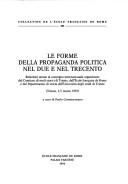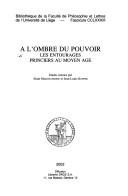| Listing 1 - 7 of 7 |
Sort by
|
Book
ISBN: 9788499650357 9788472839717 9788472839014 9788492583003 9788499652207 847283901X 9788499653259 9788472839177 8499653251 8492583002 8472839710 Year: 2007 Volume: 73, 80, 86, 96 Publisher: Barcelona: Institut d'estudis catalans,
Abstract | Keywords | Export | Availability | Bookmark
 Loading...
Loading...Choose an application
- Reference Manager
- EndNote
- RefWorks (Direct export to RefWorks)
Historiographie médiévale --- Aragon (Spain) --- History --- Espagne --- Aragon (Espagne) --- Histoire --- Historiographie médiévale. --- Littérature catalane --- Catalogne (Espagne) --- Historiographie. --- Littérature catalane --- Aragon (Spain) - History - Sources --- Historiographie médiévale.
Book
ISBN: 9783631600726 3631600720 Year: 2010 Volume: 13 Publisher: Frankfurt am Main ; New York Bern : Peter Lang,
Abstract | Keywords | Export | Availability | Bookmark
 Loading...
Loading...Choose an application
- Reference Manager
- EndNote
- RefWorks (Direct export to RefWorks)
Middle Ages. --- Historiography. --- Moyen Age --- Historiographie --- Hugues, --- Ordericus Vitalis, --- Otto --- Middle Ages --- Historiography --- Hugues, - de Fleury, - -approximately 1130 --- Ordericus Vitalis, - 1075-1143? --- Otto - I, - Bishop of Freising, - -1158 --- Historiographie médiévale --- Hugues de fleury (....-1120?) --- Orderic vital (1075-1142?) --- Otton de freising (1111?-1158) --- Historiographie médiévale
Book
ISBN: 9782915611489 2915611483 Year: 2010 Publisher: Dijon: EUD,
Abstract | Keywords | Export | Availability | Bookmark
 Loading...
Loading...Choose an application
- Reference Manager
- EndNote
- RefWorks (Direct export to RefWorks)
Middle Ages --- Historiography --- Moyen Age --- Historiographie --- Historiography. --- History --- Histoire --- Citoyenneté --- Identité collective --- Pays de l'Union européenne --- Politique et gouvernement --- European mediaeval history --- Perception in South America and Europe --- Citoyenneté - Pays de l'Union européenne --- Identité collective - Pays de l'Union européenne --- Middle Ages - Historiography --- Historiography - Europe - History - To 1500 --- Historiography - Latin America - History - To 1500 --- Pays de l'Union européenne - Politique et gouvernement --- Historiographie médiévale --- Histoire médiévale --- Amérique latine --- Europe --- Etude et enseignement

ISBN: 2728303223 9782728303229 Year: 1994 Volume: 201 Publisher: Rome: École française de Rome,
Abstract | Keywords | Export | Availability | Bookmark
 Loading...
Loading...Choose an application
- Reference Manager
- EndNote
- RefWorks (Direct export to RefWorks)
Propaganda, Italian --- Propagande italienne --- History --- Congresses --- Histoire --- Congrès --- Italy --- Italie --- Politics and government --- Politique et gouvernement --- Political science --- Propaganda, European --- Civilization, Medieval --- -Political science --- -Propaganda, European --- -European propaganda --- Administration --- Civil government --- Commonwealth, The --- Government --- Political theory --- Political thought --- Politics --- Science, Political --- Social sciences --- State, The --- Medieval civilization --- Middle Ages --- Civilization --- Chivalry --- Renaissance --- -Congresses --- European propaganda --- Congrès --- Propaganda --- Europe --- 476-1492 --- Congresses. --- Political science - History - Congresses --- Propaganda, European - History - Congresses --- Civilization, Medieval - Congresses --- Propagande --- Pouvoir (sciences sociales ) --- Représentations sociales --- Opinion publique --- Historiographie médiévale --- Aspect politique --- Moyen âge --- Aspect psychologique --- 1268-1559
Book
ISBN: 9789004184640 9004184643 Year: 2010 Publisher: Leiden: Brill,
Abstract | Keywords | Export | Availability | Bookmark
 Loading...
Loading...Choose an application
- Reference Manager
- EndNote
- RefWorks (Direct export to RefWorks)
The Encyclopedia of the Medieval Chronicle brings together the latest research in chronicle studies from a variety of disciplines and scholarly traditions. Chronicles are the history books written and read in educated circles throughout Europe and the Middle East in the Middle Ages. For the modern reader, they are important as sources for the history they tell, but equally they open windows on the preoccupations and self-perceptions of those who tell it. Interest in chronicles has grown steadily in recent decades, and the foundation of a Medieval Chronicle Society in 1999 is indicative of this. Indeed, in many ways the Encyclopedia has been inspired by the emergence of this Society as a focus of the interdisciplinary chronicle community. Also available online as part of Brill's Medieval Reference Library Online (BRMLO). The Encyclopedia fills an important gap especially for historians, art historians and literary scholars. It is the first reference work on medieval chronicles to attempt this kind of coverage of works from Europe, North Africa and the Middle East over a period of twelve centuries. 2564 entries and 65 illustrations describe individual anonymous chronicles or the historical oeuvre of particular chroniclers, covering the widest possible selection of works written in Latin, English, French, Spanish, German, Dutch, Norse, Irish, Hebrew, Arabic, Greek, Syriac, Church Slavonic and other languages. Leading articles give overviews of genres and historiographical traditions, and thematic entries cover particular features of medieval chronicles and such general issues as authorship and patronage, as well as questions of art history. Textual transmission is emphasized, and a comprehensive manuscript index makes a useful contribution to the codicology of chronicles.
History of Europe --- History of Africa --- anno 500-1499 --- Middle Ages --- Historiography --- World history --- Moyen Age --- Historiographie --- Histoire universelle --- Sources. --- History --- Early works to 1800. --- Sources --- Histoire --- Ouvrages avant 1800 --- Moyen âge, --- Chroniques --- --encyclopédie --- --Middle Ages --- Kronieken (geschiedenis) --- 930.21 "04/14" --- 091 "04/14" --- Historiografie: Middeleeuwen --- Handschriftenkunde. Handschriftencatalogi--Middeleeuwen --- 091 "04/14" Handschriftenkunde. Handschriftencatalogi--Middeleeuwen --- 930.21 "04/14" Historiografie: Middeleeuwen --- Kronieken (geschiedenis). --- Universal history --- Dark Ages --- History, Medieval --- Medieval history --- Medieval period --- World history, Medieval --- Civilization, Medieval --- Medievalism --- Renaissance --- Historical criticism --- Authorship --- Criticism --- chronicles --- Moyen âge, 476-1492 --- Middle Ages - Sources - Encyclopedias --- Historiography - History - To 1500 - Encyclopedias --- World history - Encyclopedias --- Chroniques médiévales --- Historiographie médiévale --- Historiens --- Histoire médiévale --- Encyclopédies --- Moyen âge --- Historiographie médiévale --- Histoire médiévale --- Encyclopédies --- Moyen âge


ISBN: 2870192835 9791036520631 9782870192832 Year: 2018 Volume: 283 Publisher: Liège : Presses universitaires de Liège,
Abstract | Keywords | Export | Availability | Bookmark
 Loading...
Loading...Choose an application
- Reference Manager
- EndNote
- RefWorks (Direct export to RefWorks)
France ; histoire du Moyen Age --- Frankrijk ; geschiedenis van de Middeleeuwen --- Histoire politique --- Politieke geschiedenis --- Aristocracy (Social class) --- Favorites, Royal --- Nobility --- Aristocratie (Classe sociale) --- Favoris --- Noblesse --- History --- Histoire --- Europe --- Court and courtiers --- Kings and rulers --- Cour et courtisans --- Rois et souverains --- Middle Ages --- Courts and courtiers --- 940.1 --- History Europe Middle Ages (476 - 1453) --- Middle Ages. --- History. --- Dark Ages --- History, Medieval --- Medieval history --- Medieval period --- World history, Medieval --- World history --- Civilization, Medieval --- Medievalism --- Renaissance --- Courtiers --- Manners and customs --- Queens --- Council of Europe countries --- Eastern Hemisphere --- Eurasia --- Kings and rulers. --- Politics and government --- Court and courtiers. --- Politics and government. --- Politics --- Cour et courtisans. --- Historiographie médiévale. --- Histoire sociale --- Courts and courtiers - History --- Historiographie médiévale. --- Moyen-Âge --- roi --- prince
Book
ISBN: 9780888442192 088844219X 9781771104067 Year: 2019 Volume: 219 Publisher: Toronto: Pontifical institute of mediaeval studies,
Abstract | Keywords | Export | Availability | Bookmark
 Loading...
Loading...Choose an application
- Reference Manager
- EndNote
- RefWorks (Direct export to RefWorks)
Medieval historians who have explored the abbey of Sithiu (modern Saint-Omer) have often done so to explain the competition between the canons of Saint-Omer and the monks of Saint-Bertin, a rivalry deriving from their shared origins in the abbey of Sithiu. However, David Defries's book centers on the cooperative relationship that developed between the saints Omer and Bertin in the monks' collective memory. Throughout the early Middle Ages, the cults of the abbey's two patron saints shaped the life of the community at Sithiu, and the first four centuries of its development reveal how a group of monks negotiated their place in the larger Christian West, adapting Columbanian and Benedictine identities to fit the relationship they discerned between Omer and Bertin.The evolution of Sithiu's collective memory demonstrates that the methods used in most studies of early medieval collective memory produce a distorted image of the partnership. Historians overwhelmingly assume that collective memory has a narrative structure and that the texts meant to shape its evolution are "historiographic" in form. In contrast, David Defries treats Sithiu's historiography as a type of scriptural exegesis that emphasizes the allegorical levels, especially typology and tropology, of the Christian scriptural hermeneutic. Paradigm, not narration, structured early medieval Christian allegory and thus early medieval collective memory at the abbey.This argument has broad implications for the study of early medieval collective memory. The intellectual culture of Sithiu was typical of the early medieval West, and all the texts considered date between c. 740 and c. 1148, situating them in a period when writers trained in monasteries like Sithiu produced the vast majority of western European literature. From Sithiu to Saint-Bertin may thus be seen as a preliminary case study for the value of paradigmatic approaches to early medieval memory.
Christian saints --- Monks --- Monasticism and religious orders --- Collective memory --- Saints chrétiens --- Moines --- Monachisme et ordres religieux --- Mémoire collective --- Historiography. --- Cult --- History --- Culte --- Historiographie. --- Histoire --- Saint-Bertin (Monastery : Saint-Omer, Pas-de-Calais, France) --- Saint-Bertin (Monastère : Saint-Omer, Pas-de-Calais, France) --- 600-1500 --- Saint-Omer (Pas-de-Calais, France) --- France --- Church history --- Histoire religieuse --- 27 <44 SAINT-OMER> --- 27 <44 SAINT-OMER> Histoire de l'Eglise--Frankrijk--SAINT-OMER --- 27 <44 SAINT-OMER> Kerkgeschiedenis--Frankrijk--SAINT-OMER --- Histoire de l'Eglise--Frankrijk--SAINT-OMER --- Kerkgeschiedenis--Frankrijk--SAINT-OMER --- Historiographie médiévale. --- Bertin --- Mémoire collective --- Abbaye Saint-Bertin --- Mémoire collective. --- Historiography --- Christian spirituality --- Christian religious orders --- Saint-Omer --- Bertinus ab. Sithivensis --- Saint-Bertin --- Audomarus ep. Tarvannensis --- Historiographie médiévale. --- Mémoire collective.
| Listing 1 - 7 of 7 |
Sort by
|

 Search
Search Feedback
Feedback About UniCat
About UniCat  Help
Help News
News